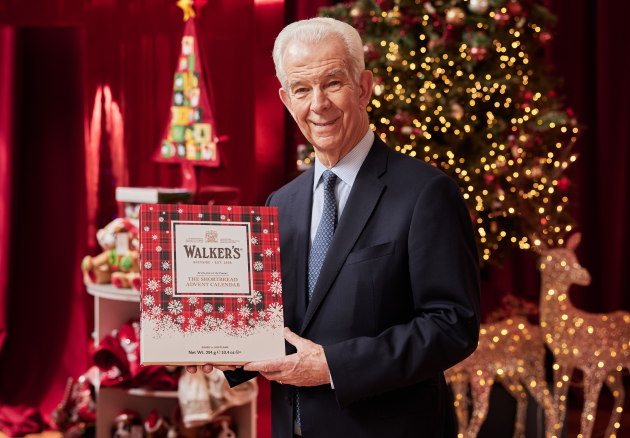The importance of shortbread as part of Christmas cuisine is as fixed for some as fruit mince tarts and Christmas pudding with brandy custard. When your brand is globally recognised and associated with shortbread, for Walker’s Shortbread it is time to shine. Kim Berry asked CEO Sir Jim Walker some questions during his recent visit to Australia.
In FY23, Walker’s recorded a 16 per cent rise in turnover, boosted largely by export revenue growing almost 10 per cent.
Sir Jim and his family credit Australia for the significant role it has played in the company’s growth, with Australia consuming the most shortbread per capita outside of Scotland. We eat three times as much per person as the US.
This year, the sale of commemorative tins for the Queen and coronation tins for the King saw revenue from Australian increase almost 10 per cent.
The festive season is set to build on that, with half a million Walker’s mince pies to be consumed by Australian families and 3500 advent calendars to be sold across the nation.
The Walker family has been making Shortbread for 125 years. What level of involvement does the family have in operations, and how often has a piece of shortbread and a cup of tea (or perhaps a dram of whisky) had to have been deployed to smooth any familial friction?

The company is still owned and run by the Walker family. We currently have seven Walker family members from the third, fourth and fifth generation working across the business.
We also now have on board several experienced directors and senior managers who bring a good balance of skills to the company who are not family and are making a huge contribution.
We’re pleased to say there is very little familial friction, but any issues are normally sorted out there and then.
We certainly enjoy eating shortbread all the time, particularly during any long meetings and a dram of whisky together at times can make for a relaxing moment in an evening.
A lot has changed in 125 years of food manufacturing, can you tell us about operations today?
The company started off as a village bakery. We operate six factories in total with all production based in Scotland – four factories in Aberlour and two in Elgin.
We have offices in England, the US, and Germany but all of our products are produced in Speyside, Scotland, which is very important to us.
In fact, the Scottish climate is perfect for creating shortbread – it’s not too hot, or too cold, so our butter is the perfect consistency.
The factories operate for 15 hours a day around the year. During peak periods, such as in the lead up to Christmas, they will also be operating on weekends and for extended hours during the week.
Shortbread Fingers are our best-selling product with approximately 2.2 million of them baked in our factories every day.
Do different factories produce different products?
Each of our factories produce different products. There are about 24 production lines in total but our important and most-loved products, such as our Shortbread Fingers, can be made on different lines and in different factories. This is so that in case of any disaster such as a fire, we would be able to keep running and ensure our customers don’t have to go without our shortbread.
What sort of equipment is used?
The equipment is normally standard equipment, with adjustments made to suit our requirements in different areas. Everything is made on conveyor ovens linked to packing machines for efficiency.
Globally the industry is under a lot of pressure, from supply chain disruptions, geo-political instability, Covid, and now (in Australia at least) rising energy costs, inflation, and cost-of-living pressures. We have seen wheat supply impacted (and Western Australia, currently mid-harvest, had a catastrophic hailstorm last week wiping out half this season’s crop) and dairy prices really playing havoc with supply and cost of ingredients for manufacturers.
The last four years have been extremely challenging because of the results of Brexit, the Covid pandemic and supply chain shortages for various reasons.
The result of this is that many of our basic raw materials have increased in price dramatically over the last three years. It has not been possible to pass this all this increased cost on to the consumer so we have absorbed as much as we possibly could. Because of this, whilst our turnover has recovered to above 2019 levels, our margins have been greatly impacted over the last three years.
We have had to make many changes to our working practices, streamline our product ranges and have sadly had to discontinue some products which were very labour-intensive and had become unprofitable.
We are continuously working at improving our efficiency and are now using robotic equipment where possible.








